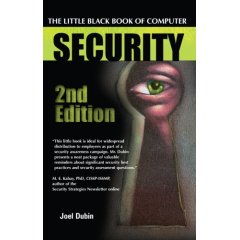The Hacking Exposed series recently came out with a new book,
Hacking Exposed Web 2.0, which covers the new web technologies under the 2.0 rubric. Though this is a thinner volume, only 258 pages, than the other books in the series, it goes beyond the
Hacking Exposed Web Applications, which is already in its second edition.
Hacking Exposed Web 2.0 focus on common injection attacks, like SQL injection, cross-site scripting (XSS), HTML injection and cookie manipulation, as well as, the next generation of attacks. These include cross domain, JavaScript, AJAX and .NET attacks. There's also a section on ActiveX and Flash attacks, which have also been the rage recently.






